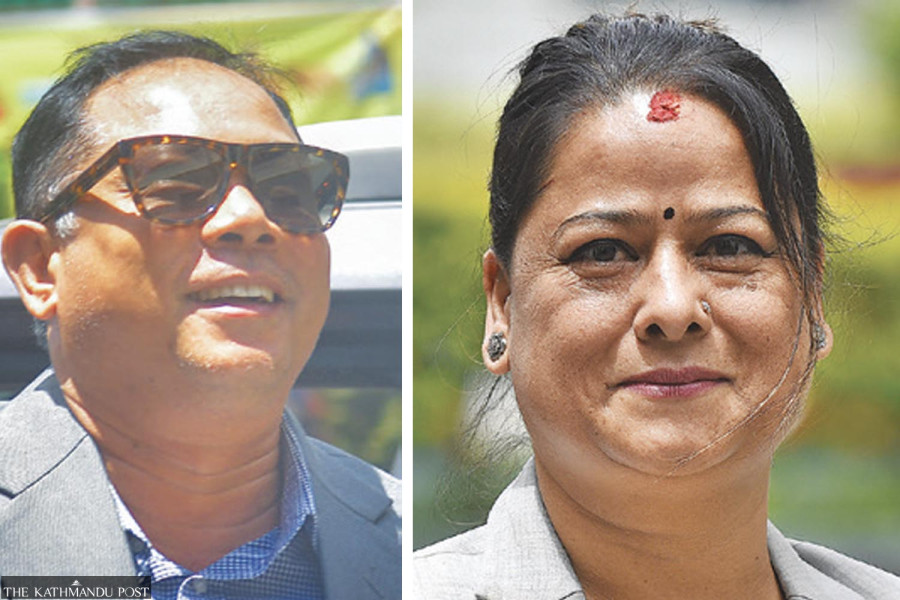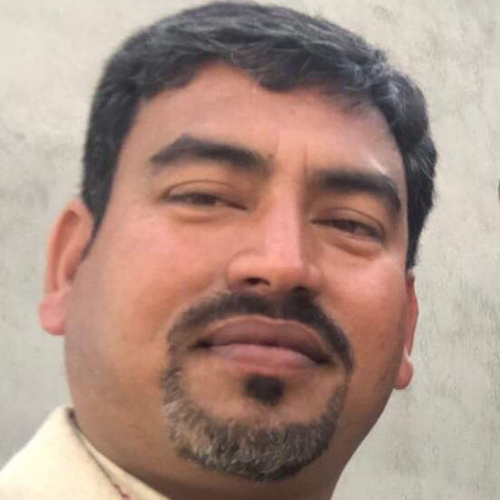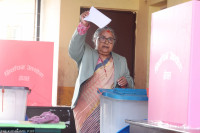Politics
Bitter husband-wife rift throws Nagarik Unmukti Party into chaos
Power clash between Resham and Ranjita has fractured the party born of Tharu movement.
Arjun Shah
In what has become a classic example of personal ambition derailing a political movement, the power struggle between Resham Chaudhary and his wife Ranjita Shrestha has left the Nagarik Unmukti Party (NUP) in shambles. Established as a political outfit born out of the Tharuhat movement’s fire and fury, the party now lies fractured with an uncertain future.
The tension between the couple, once united by the cause of justice for the Tharu community, has escalated into a full-blown political feud. Their party, which rose to prominence quickly after its establishment in late 2021, is now caught in a storm of infighting and series of expulsions and parallel activities.
While Resham Chaudhary was still in prison, serving a sentence handed down for his alleged involvement in the 2015 Tikapur incident that left eight police officers and a child dead, the Tharu community stood firmly behind him. Their support translated into political capital, and from behind bars, Resham laid the groundwork for the NUP. Registered in the Election Commission under the leadership of his wife Ranjita on January 3, 2022, the party has had a meteoric rise.
In the 2022 local, provincial and federal elections, the NUP made a significant impact. Four of its members were elected to the House of Representatives. It won 99 local-level seats in Kailali, the home district of Resham Chaudhary, alone and secured seven provincial seats in Sudurpaschim, four in Lumbini and one in Madhesh. With no single party holding a majority in the 53-member Sudurpaschim Assembly, the NUP became a kingmaker in provincial politics.
However, cracks began to show soon after. According to Tharu leaders close to the party, things began to fall apart after Resham’s release from prison in May 2023 through a presidential pardon. While Ranjita had been managing party affairs in consultation with her husband during his jail term, his release changed the power dynamic.
Resham began to unilaterally take control of party operations, sidelining Ranjita. "He (Resham) bypassed her, ignoring the formal structure of leadership. That’s when the seeds of discord were sown,” says Krishna Sarbahari, a political analyst and close observer of the party’s internal developments.
The breaking point came during the party’s first national convention in Tikapur in January 2024, where Resham pushed to be party chair without Ranjita’s consent. Ranjita, still the official chair, left the convention mid-way and returned to Kathmandu in protest.
Although Resham was elected chair during the convention, the legitimacy of the election was challenged. On March 7, 2024, the Election Commission invalidated the convention and reinstated the original committee under Ranjita’s leadership. This ruling intensified the rift and divided the party’s central committee and parliamentary factions into rival camps.
Resham’s faction took the matter to the Supreme Court, seeking validation of his leadership. In response, Ranjita submitted a written statement asserting that Resham, convicted in a heinous criminal case, was unfit not only to lead the party but also to be its member.
She referenced the Supreme Court’s ruling in the Tikapur case, which described Resham’s actions as “inhuman and cruel,” and argued that his presidential pardon was an act of clemency, not an erasure of moral culpability. “Granting him full political rights post-pardon mocks the justice system,” she argued.
The feud even turned physical. On April 1, 2024, at the party’s central office in Anamnagar, Kathmandu, members of the two factions clashed. In Sudurpaschim, the NUP lawmakers frequently split on major parliamentary votes. Five provincial members supported Resham, while two backed Ranjita. The division cost the NUP a chance to claim the chief minister’s post following Kamal Bahadur Shah’s resignation.
When Shah’s government collapsed, both Resham and Ranjita factions nominated separate candidates for the chief minister’s berth—Laxman Kishor Chaudhary and Kailash Chaudhary respectively. The provincial chief dismissed both claims, citing internal conflict and called for fresh nominations. The deadlock allowed the CPN (Unified Socialist) leader Dirgha Bahadur Sodari to slip through the middle and become chief minister with support from the NUP’s Ranjita faction, the CPN (Maoist Centre), the CPN-UML and an independent member.
The episode highlighted how internal disunity within the NUP squandered a historic opportunity for Tharu representation in provincial leadership. Ranjita’s refusal to support Laxman Kishor, despite him having majority support within the party, proved decisive.
Ranjita responded by taking disciplinary action. She expelled key figures from the Resham camp, including provincial Minister of State Indira Giri, who later had her membership reinstated by the Supreme Court. She also tried to remove Ghanashyam Chaudhary as parliamentary leader, appointing Kailash Chaudhary in his place. Speaker Bhim Bahadur Bhandari, however, refused to recognise the move due to majority support for Ghanashyam.
In June 2024, Ranjita was removed as parliamentary leader by three of the NUP’s four federal lawmakers, who appointed Ganga Chaudhary instead. Ironically, despite its infighting, the NUP holds the distinction of having all seven of its Sudurpaschim lawmakers serve as ministers within a short span.
The NUP’s power struggle has been further tainted by scandals. Ranjita is currently under investigation for irregularities in a land deal in Pokhara’s Lichhibari area. In Sudurpaschim, two ministers were implicated in financial misconduct. An audio clip suggesting collusion with timber smugglers forced Minister Laxman Kishor Chaudhary to resign in April. His replacement Ramashwar Chaudhary was later sacked in July over alleged budget irregularities.
Meanwhile, a planned merger with CK Raut’s Janamat Party in May 2025 was abruptly scrapped after Resham was arrested at the unification venue. The agreement had proposed forming a new entity—“Nagarik Janamat Party”—with Resham as patron, Raut as chair, and Ranjita as co-chair. However, insiders say Ranjita was never fully on board, viewing the co-chair role as toothless. Following Resham’s arrest, communication between the two parties halted, and the merger process ended, at least for the time being.
As the latest factional feud of the party unfolded, Resham’s faction continued consolidating control. On July 31, a national gathering expelled Ranjita from the party. Lalbir Chaudhary, Resham’s father and a federal lawmaker from Bardiya-2, was named the new party chair.
Ranjita dismissed the move as illegitimate and vowed legal action. As an apparent political vendetta, Ranjita sought a clarification from parliamentary party leader Gangaram Chaudhary.
With each side claiming legitimacy and the legal battles ongoing, the Nagarik Unmukti Party now appears irreparably split. Grassroots leaders express deep frustration. “Neither side is in a mood to back down. The party’s future is in jeopardy,” said Pradeep Chaudhary, Kailali district chairman of the NUP.
Some political observers say the very forces that propelled the NUP to power—public sympathy and grassroots energy—have now been consumed by personal ambition and infighting. “The statute may favor Ranjita, but public sentiment is with Resham. That’s the tragedy of this party,” said a party insider speaking on condition of anonymity.




 27.48°C Kathmandu
27.48°C Kathmandu













